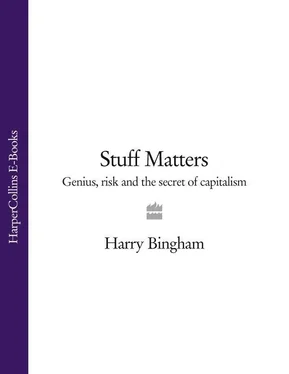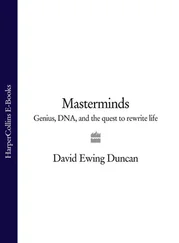Stuff Matters
Genius, Risk and the Secret of Capitalism
Harry Bingham

For N
‘See how the true gift never leaves the giver: returned and redelivered, it rolled on until the smile poured through us like a river.’
Cover Page
Title Page Stuff Matters Genius, Risk and the Secret of Capitalism Harry Bingham
INTRODUCTION
PART ONE The Entrepreneur
ONE Risk
TWO Will
THREE Persuasion
FOUR Invention
FIVE Bastards
PART TWO The Money Men
SIX Bankers
SEVEN Investors
EIGHT Masters of the Universe
NINE Bean-Counters
PART THREE Firms and Markets
TEN Markets
ELEVEN The Firm
TWELVE Agents
THIRTEEN Psychopaths
FOURTEEN Generation Bollywood
PART FOUR Into Our Heads
FIFTEEN Morons
SIXTEEN Happiness
SEVENTEEN Bubbles
PART FIVE Theories
EIGHTEEN Economists
NINETEEN Motivations
TWENTY Ideologies
PART SIX Genius, Risk and the Secret of Capitalism
TWENTY-ONE Genius, Risk and the Secret of Capitalism
FURTHER READING
NOTES
INDEX
Acknowledgements
Copyright
About the Publisher
This is a story which begins with a 7-year-old girl, a broken cooking pot, and a financial crisis.
The 7-year-old, Kat, is the daughter of some good friends of ours and not long ago she spent the weekend with my wife and me. Although we’d lined up a full programme of entertainment, the thing that Kat enjoyed most was our house, a picture perfect thatched cottage. She liked the huge old fireplaces, the chambers once used for smoking meat, the brick ovens used for baking bread. She loved scrambling up into the loft, where you can still see the original thatch poking through the original 350-year-old roof battens.
More than that, Kat was awestruck that the battens had simply been cut from the hedge outside the window, the thatching straw from the field just beyond. In Kat’s world, things come from shops, or on trucks, or by order over the internet. Houses certainly aren’t hand-built by their owners, using only materials to be found in the surrounding fields and hedgerows. In her eyes, the house was something from a fairy tale, a place that stood half a step from reality.
She was also peculiarly interested in an old metal cooking pot that stands on the hearth, and which we use to store newspaper, firelighters and other bits and pieces for the fire. Kat had somehow got it into her head that the cooking pot too was 350 years old and it fascinated her that this object had (as she thought) once been handled by someone old enough to be her eighteen-times-great grandmother. I didn’t have the heart to put her straight for two reasons. First, because the pot certainly looks battered enough to have seen off a century or two, and second, because I knew that a widow once living in this house did own an iron cooking pot. I know that because a neighbour had lent me a volume of local history which happened to record the old lady’s will, a document that bequeathed her terribly few possessions to different family members: a stool to one, some farming implements to another, a ‘cooking pot with a broken lid’ to a third and so on. Though she had almost nothing to leave, she nevertheless cared about the little she had. Back then, stuff mattered. Kat somehow sensed that. She understood that this fairy-tale world played by rules different from her own.
We had a lovely weekend with Kat, and when she left, the cooking pot reverted to its previous, non-magical status as Place to Store Firelighters. Quite likely, I’d have thought no more about it, except for the last ingredient of this tale: a financial crisis. Because all this took place the week after Fannie Mae and Freddie Mac imploded. The week when Lehman Brothers went spectacularly bust. The week when the Federal Reserve made an $85 billion loan to bail out the collapsed insurer AIG. The week when Merrill Lynch, a giant investment bank, was sold to Bank of America. The week when the speculative attacks on HBOS, a massive British bank, grew so intense that it too lost its independence.
Next to all of these calamities, the previous victims of the credit crunch hardly seemed to matter. Northern Rock? Phooey! What’s £25 billion between friends? Prior to that week, the biggest American victim of the credit crunch had been Bear Stearns, an investment bank forced to sell out for a derisory $2.2 billion. This week, no one was deriding any sale, no matter how small the consideration. You almost got the feeling that if you’d walked down Wall Street in possession of $10 and a bagful of doughnuts, you could have purchased any bank you wanted. ‘The doughnuts too, sir? You’re too kind.’
In these giddy conditions, a quotation came into my head, one that I couldn’t immediately place but which lingered anyway: ‘All that is solid melts into air, all that is holy is profaned.’ The rhythms were wrong, but the phrase possessed an almost Shakespearean intensity. Sensing that there was more to the fragment than I was remembering, I looked it up:
All that is solid melts into air, all that is holy is profaned…
Modern bourgeois society…a society that has conjured up such gigantic means of production and of exchange, is like the sorcerer who is no longer able to control the powers of the nether world whom he has called up by his spells…It appears as if a famine, a universal war of devastation, had cut off the supply of every means of subsistence; industry and commerce seem to be destroyed. And why? Because there is too much civilization, too much means of subsistence, too much industry, too much commerce.
– KARL MARX and FRIED RICH ENGELS,
The Communist Manifesto
Marx and Engels were writing 160 years ago, yet their description fits the 2008/9 financial crisis almost perfectly. All that is solid has melted into air – or, to be more precise, has melted into the hands of a number of very surprised governments and furious taxpayers, the Wall Street sorcerer no longer in control of his spells.
Now, it’s probably best to say straight away that I’m no communist. I got a degree in economics from Oxford University, then went straight into the City, where I spent a couple of years working for J.P. Morgan, the same fine bank that went on to buy Bear Stearns for those $2.2 billion.
After two years, I quit. I was an idealistic soul and thought that my talents, such as they were, might be better directed for the Good of Humanity. I’d originally intended to use my training at J.P. Morgan to talk my way into the World Bank, but this was 1989. The Berlin Wall was being torn down. The decrepit Soviet empire was breaking up. The old socialist model had failed, but there was an immense amount of work to be done before the capitalist model could get going properly. In short, Eastern Europe needed help. It needed me. So I took a temporary post offering economic advice to the newly democratic government in Poland (it folded shortly afterwards), then found a full-time post at EBRD, a development bank set up to rebuild the East.
I spent the next eighteen months zooming round Eastern Europe, seeking to invest in the promising private enterprises which were springing up everywhere. It was a time of extraordinarily rapid change and, for those of us lucky enough to be in the right place at the right time, responsibility too. But I became disenchanted. Not with the Easterners, who were turning their countries round with extraordinary speed, but with the EBRD itself. The EBRD was owned by a consortium of several dozen governments from East and West, who encumbered it with a hopelessly top-heavy and bureaucractic approvals process. The longer I spent in Eastern Europe, the more I noticed that it was those greedy so-and-sos from the private sector who were doing all the really amazing work – pouring in money, people, skills, energy and know-how. We poor saps in the Good of Humanity sector were coming a distant and unbeloved second.
Читать дальше













